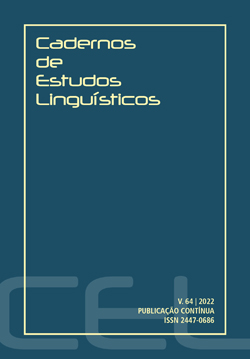Abstract
Questions have been raised in the literature about language teaching methodologies (in linguistic analysis, literature, reading and writing) in school education. Several works have been produced that contribute to the debates about the role of reading literature in Portuguese and how to develop it. However, even so, there still seems to be a gap when it comes to investing in works that combine literary theories (e.g. narratology), pedagogical theories and discursive theories. As a result, some important references have been launched, but these still reinforce the legal, economic and political relations that lead teachers (responsible for teaching the reading of literature) and students (trainee readers of literature) to make identifications which need to be understood in terms of how they operate if debate is to be fostered about the continued presence of authoritarianism and liberalism in literature reading practices in school education. This leads us to some fundamental concepts of discourse analysis developed by Michel Pêcheux and Eni Orlandi, such as interpretation, comprehension, reading, authorship and subject, and to some reflections by Dermeval Saviani on the historicity of teacher training and of a historical and critical pedagogy in Brazil. Drawing on these references, a reading of Letramento Literário (2006), by Rildo Cosson, is proposed. This book is a popular reference in literature teacher training courses in Brazil. From the discursive analysis of some passages from this book, we aim to understand the functioning of statements that, ironically, end up corroborating legal, economic and political relations in language and which therefore merit attention when developing reading skills (and in the recognition of their social division). They can be seen as paraphrasing ideas of authoritarianism and productivism, and the exclusion of some subjective positions in the formation of society (transformed by the metaphor of “reading freedom”, “reader freedom” through literacy).
References
ALTHUSSER, Louis. De O capital à filosofia de Marx. In: ALTHUSSER, Louis et al. Ler o Capital. Rio de Janeiro: Zahar, 1979.
ALTHUSSER, Louis. Aparelhos ideológicos de estado. Rio de Janeiro: Graal,1992.
BIZIAK, Jacob dos Santos. Do valor da letra: um ensaio sobre letramento e ideologia. In: Jacob dos Santos Biziak; Daiane Padula Paz. (Org.). O que podem as licenciaturas em tempos de crise? (im)possíveis respostas do Instituto Federal do Paraná, campus Palmas. 1ed.São Carlos: Pedro & João Editores, 2020, v. 1, p. 347-367.
CANDIDO, Antonio. O direito à literatura. In: ___. Vários Escritos. 5 ed. Rio de Janeiro: Ouro sobre Azul/ São Paulo: Duas Cidades, 2011.
COSSON, Rildo. Letramento literário: teoria e prática. São Paulo: Contexto, 2006.
GERALDI, João Wanderley. et al. (orgs.). O texto na sala de aula. 3. ed. São Paulo: Ática, 1999.
GUIMARÃES, Eduardo. Semântica: enunciação e sentido. Campinas: Pontes, 2018.
LAGAZZI, Suzy. Em torno da prática discursiva materialista. Organon, Porto Alegre, v. 30, n. 59, p. 85-100, 2015.
MASCARO, Alysson Leandro. Estado e Forma Política. 1. ed. São Paulo: Atlas, 2013.
MASCARO, Alysson Leandro. Direitos humanos: uma crítica marxista. Lua Nova, 2017, no.101, p.109-137.
NUNES, José Horta. Aspectos da forma histórica do leitor brasileiro na atualidade. In: E. P. Orlandi (org.). A leitura e os leitores. 1ed. Campinas: Pontes, 1998.
ORLANDI, Eni Pucinelli Discurso e leitura. 5.ed. São Paulo: Ed. da Unicamp, 1999.
ORLANDI, Eni Pucinelli A leitura e os leitores. Campinas, SP: Pontes, 2003.
ORLANDI, Eni Pucinelli Discurso e texto: formulação e circulação dos sentidos. 2a ed. Campinas, SP: Pontes, 2005.
ORLANDI, Eni Pucinelli Educação em direitos humanos: um discurso. In: SILVEIRA, Rosa Maria Godoy et alii. (org.). Educação em direitos humanos: fundamentos teórico-metodológicos. 1. ed. João Pessoa: Editora Universitária, 2008, p. 295-311.
PACHUKANIS, Evgeni. Teoria Geral do Direito e Marxismo. São Paulo: Boitempo, 2017.
PÊCHEUX, Michel. Ler o arquivo hoje. In: ORLANDI, Eni Puccinelli (org.) [et al.]. Gestos de leitura: da história no discurso. Campinas, SP: Editora da Unicamp, 1994.
PÊCHEUX, Michel. Papel da Memória. IN: Pierre Achard et al. Papel da Memória. Campinas, SP: Pontes, 1999.
PÊCHEUX, Michel. Semântica e Discurso. Uma Crítica à Afirmação do Óbvio. Tradução Eni P. de Orlandi et alii. Campinas: Editora da Unicamp, 2009.
POULANTZAS, Nicos. Poder político e classes sociais. Campinas, Editora Unicamp, 2019.
SAVIANI, Dermeval. O trabalho como princípio educativo frente às novas tecnologias. In: FERRETTI, Celso João et al. Novas tecnologias, trabalho e educação: um debate multidisciplinar. Petrópolis, RJ: Vozes, 1994.

This work is licensed under a Creative Commons Attribution-NonCommercial 4.0 International License.
Copyright (c) 2022 Cadernos de Estudos Linguísticos


